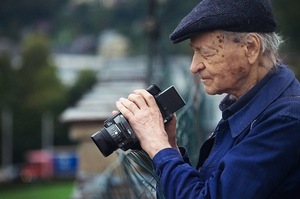Odysseus never returned 6
In brief: As the poet and filmmaker Jonas Mekas visited Kaunas last week, the community of Vytautas Magnus University remembered the solemn event of granting regalia of doctor of honour to the artist almost 16 years ago. The majority of participants of the meeting with the artist were interested in J.Mekas’ opinion about changes – how Kaunas and university changed. The poet answered poetically: “the rain is the same, perhaps only more impure.”
Speaking about the return, the poet denies all possible impications – it is not possible to return and to step to the same river twice. According to J. Mekas, Odysseus never returned home. On another hand, J. Mekas loves oxymorons: it is impossible to return physically but you can always return while creating - it is unavoidable. The majority of poetry and cinema works of J.Mekas are created on the basis of this assumption.
The selection of poems “Idylls of Semeniškės” (which will be republished in German in Germany this year) and the film “Reminiscences from the Trip to Lithuania” (1972) is the closest to this theme. “Idylls of Semeniškės” in particular started the nostalgic and slightly sentimental trajectory of being in the dearest place, Homeland, made in thoughts. In the aforementioned selection of poetry the lyrical subject returns to the left Semeniškiai.
The film created at the beginning of the eighth decade presents memories again, which are physical and more painful, tragic and beautiful, making the returning person wonder this time. Episodes filmed during the first visit of the poet in the occupied Lithuania form the film.
Both works “Idylls of Semeniškės” and “Reminiscences from the Trip to Lithuania” are completely non-ideological works as no idea is rendered by them. Ideas are not typical of J. Mekas, he presents reactions to the life surroundings instead. It is one more answer to the question about anti-intellectual outlook of J. Mekas. J. Mekas cannot return to Lithuania and perhaps will never be able to not only due to the fact that it changes all the time but also due to the fact that J. Mekas never left it in fact.
Lithuanian birches grow at the house of J. Mekas in Brooklyn, the poet sees them daily. Semeniškiai in New York. Such life says that you are constantly responsible for the place you have (not) left. For yourself in it and for a close person.
Empathy and emotions are more important than thought for J. Mekas. The avant-garde artist creates an occasion for one more oxymoron – his avant-garde is the return to the very beginning, where there is no time, therefore, it is not the past. The modern man has forgotten this archaic status and this is why he is torn by internal contradictions.
J. Mekas said in one interview more than a year ago: “Scientists feel hard and bored sometimes. Then poetry and music comes to help.” Poetry and music mean this deep knowing which the human mind does not use simply. Knowing expressed by music and poetry does not strive to control and create schemes. It is the ground for freedom. J. Mekas spoke about it during the meeting with students and scientists at artes liberales university. Even if he did not visit Kaunas any more, this city is a festival to him already (like in Ernest Hemingway’s novel “Festival that is Always with You”), which will never end as he never left this city. The universal Semeniškiai has involved Kaunas too.

